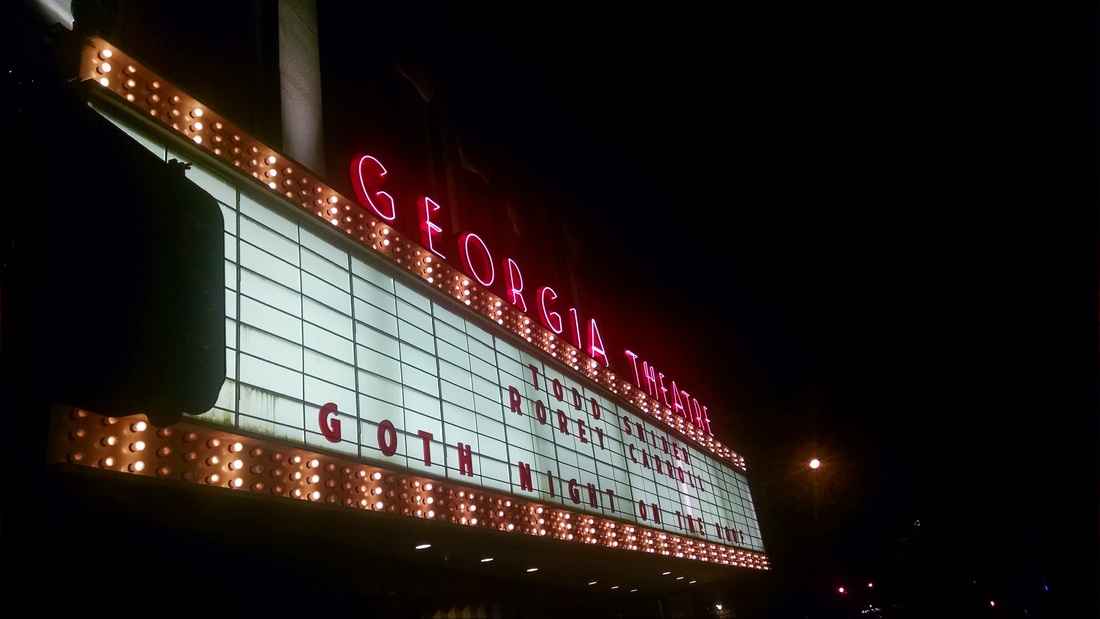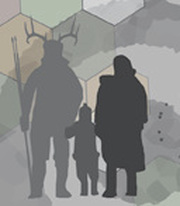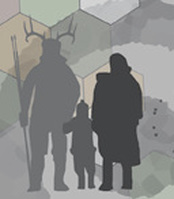Conference fatigue is one sign that you're doing it right. Another is leaving with more excitement and ideas than you walked in with. I can't speak for anyone else's experience, of course, but I saw some really interesting papers and talked to a lot of interesting people. A lot of the questions I'm interested in require information from a lot of different areas across large time spans, so I'm still in the process of working my way up the proficiency slope of Southeastern archaeology and learning as much as I can as quickly as I can. I apologize if I met you and you felt interrogated.
The session that really brought the point home was a symposim titled "A Ritual Gathering: Celeberating the Work of Cheryl Claassen" (Session 3 in the program). Claassen, a professor at Appalachian State, has been pushing the boundaries of the archaeological conversation in the Eastern Woodlands for decades (you can see some of her work on her Academia.edu page). The papers in this session (many by her students) evoked responses in me ranging from "what a profoundly interesting thought" to "are you sure about that?" to "get off my case." It was great.
(As an aside, I wish that some of my friends on the "fringe" could have seen these papers. Perhaps if you witnessed a professional archaeologist discussing how the skeletal remains of immature bird wings in a feature were connected to the astronomical scheduling of seasonal ritual aggregation events, you'd have a better appreciation both for the kinds of questions that actual archaeology can address and the level of work it takes to convincingly address those questions. The claim that archaeologists are afraid to say anything new or different is preposterous.)
I want to state clearly that, in my opinion, the expansion of thought that was on display in the Claassen session is a positive thing with a lot of potential upside. As an advocate of a complex systems approach to understanding human cultures in the past, it makes perfect sense to me that ritual and belief are involved in both "bottom up" and "top down" aspects of human societies. I see no logical or analytical reason to assume that ritual and belief are epiphenomenal or unimportant compared to other domains of social, economic, and political life. It all matters, and it's all fair game for trying to flesh out the past as best we can and trying to explain, using all the tools at our disposal, how those societies worked and why and how they changed.
For me, however, my positive regard for the role of belief and ritual in human societies (and for the appropriateness of including it in our discussions) doesn't alleviate concerns about how we study it in the past tense. I know that I'm not alone here. I think several legitimate worries underlie uncertainties about both the approaches and the conclusions reached by those focused on belief and ritual.
One concern that's out there -- perhaps the major one -- is a feeling that the "ritual" people are jumping outside the established lines of scientific process in a way that undermines confidence in their conclusions. Talking with a few of my colleagues about this, I got the sense that people are not closed to the questions so much as they are skeptical of the methods (or the perceived lack of methods) used to address those questions.
I conceive of science as an inductive-deductive loop. On the inductive side, you create an explanation to fit a bunch of data. On the deductive side, you collect new information to test an expectation derived from your explanation. Ideally, the two sides of the loop are exploited together to create (eventually) a credible explanation that fits all the available information and makes further predictions about the world that are falsifiable but not falsified. As long as you get yourself into this loop, you're doing science. It doesn't really matter what the starting point is or where an idea comes from as long as you're willing to follow through and ride the inductive-deductive roller coaster around the track for as long as it takes.
Are there ways to skeptically evaluate ideas about Archaic ritual and belief systems and make sure we're utilizing the full power of the inductive-deductive loop? I'm sure that there are. What I'm less sure of, at this point anyway, is the presence of an appetite for the deductive side of the loop that matches the robust enthusiasm for climbing up the inductive side. No matter how interesting or appealing an interpretation is, you still have to put on the skeptic glasses and try to find the seams you can follow to figure out whether you're right or wrong.
The inductive-deductive loop is critical in archaeology because of all of our equifinality problems: there's usually more than one way something could have happened, so how do you know what the real cause was? You have to do the work to assemble independent lines of evidence, build theory, collect data, construct and test hypotheses, etc. You can't skip all that and just hug an assertion. Well, you can, but I won't buy what you're selling.
That leads me to a second concern: the burden of proof. Who's is it? Does it have to reside in one domain of inquiry, or is it the responsibility of the person making the claim no matter what the claim actually is? At one point in the session I heard the phrase "can you prove it's not a ritual assemblage?" I take the point of the question (which was used mainly, I think, to argue that we should always consider ritual as a possibility), but I'm uncomfortable with the notion that we should accept/assume that something is related to ritual unless we can prove it's not. I think we all realize that people's lives are often not partitioned neatly into "ritual" and "non-ritual" components, but that doesn't mean all activities should be presumed to be ritualistic in nature unless we can prove they're not. That seems to me to be out of bounds of the way good science is done. There has to be a positive case made for a claim, whether it's about ritual or not.
And that brings me to my third concern: the appeal to human "universals" to gird claims about past ritual behavior. Several times, in several different papers, I heard the assertion that all humans share a basic set of experiences in the material world and therefore all belief systems share a similar set of components tied to that material world: fire transforms, the sky is above and the earth is below, water goes down and smoke goes up, etc. This seems logical and may well be true (I haven't yet read through the arguments to evaluate them on my own). My concern is not that such universals don't exist, but that playing the "universal" card as the basis for analysis rather than an empirical problem may do two counter-productive things: (1) short circuit the inductive-deductive cycle by introducing a powerful, unvetted assumption; and (2) actually bland out the kind of contextual variability that could potentially be very interesting and analytically useful.
This last point is somewhat ironic. Many of the issues that the pursuit of ritual and belief articulates with have a particularly "post-processual" flavor. One of the main critiques leveled at the processual archaeology of the late twentieth century was that it didn't account for the meanings of objects in their contexts. Symbols and objects do not mean the same things in different cultures: context matters. It seems to me that by falling back to "universals" as explanation we're actually ignoring context altogether -- if something is present everywhere, what meaning does it actually have?
One of my professors at Southern Illinois University was fond of repeating the phrase "playing ethnosemantic tennis with the net down" (if my memory serves me right, he used the phrase in connection with criticisms of Claude Levi-Strauss). If we lay down a foundation of presumed "universals" and then build an analysis based on those, I worry that we're lowering the net significantly if not taking it down altogether. Opening things up is great for generating discussion and new approaches, but at some point the net has to go back up so we can have some mechanism for discriminating between credible and non-credible explanations.
I'm excited by what I saw and heard at SEAC. We've still got a long way to go to address many basic space-time issues for some of the questions that I and many others are interested in. That doesn't mean, of course, that we can't think about other additional things while that's going on. I bought Claassen's (2015) book Beliefs and Rituals in Archaic Eastern North America at SEAC. I look forward to seeing what's inside and comparing it to my own views and knowledge about the eastern Archaic. Nothing that I've said in this post should be construed as pointing at the content of the book, which I have not read yet. I anticipate the book will be a stimulating read. Should be fun!



 RSS Feed
RSS Feed
